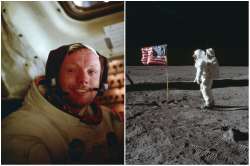50 years ago today, 'one small step' of Neil Armstrong changed the course of future
Armstrong, who died in 2012 at age 82, said he came up with the statement himself. In a 2001 NASA oral history, he said NASA discouraged coaching astronauts, a position reflected in a NASA memo. It cited how "the truest emotion ... is what the explorer feels within himself."

A half-century ago, in the middle of a mean year of the war, famine, violence in the streets and the widening of the generation gap, men from planet Earth stepped onto another world for the first time, uniting people around the globe in a way not seen before or since.
Hundreds of millions tuned in to radios or watched the grainy black-and-white images on TV as Apollo 11's Neil Armstrong and Buzz Aldrin set foot on the moon on July 20, 1969, in one of humanity's most glorious technological achievements. Police around the world reported crime came to a near halt that midsummer Sunday night.
Astronaut Michael Collins, who orbited the moon alone in the mother ship while Armstrong proclaimed for the ages, "That's one small step for man, one giant leap for mankind," was struck by the banding together of Earth's inhabitants.
"How often can you get people around our globe to agree on anything? Hardly ever," Collins, now 88, told The Associated Press in a recent interview. "And yet briefly at the time of the first landing on the moon, people were united. They felt they were participants."
He added, "It was a wonderful achievement in the sense that people everywhere around the planet applauded it: north, south, east, west, rich, poor, Communist, whatever."
That sense of unity did not last long. But 50 years later, Apollo 11 — the culmination of eight years of breakneck labor involving a workforce of 400,000 and a price tag in the billions, all aimed at winning the space race and beating the Soviet Union to the moon — continues to thrill.
"Think of how many times you hear people say, 'Well, if we could land a man on the moon, we could certainly do blah, blah, blah,'" said NASA chief historian Bill Barry, who like many other children of the 1960s was drawn to math and science by Apollo. "It really, I think, has become a throwaway phrase because it gets used so often. It gets used so often because I think it had an impact."
What did Neil Armstrong really say when he took his first step on the moon?
Millions on Earth who listened to him on TV or radio heard this :
"That's one small step for man, one giant leap for mankind."
But after returning from space, Armstrong said that wasn't what he had planned to say. He said there was a lost word in his famous one-liner from the moon: "That's one small step for 'a' man." It's just that people just didn't hear it."
During a 30th anniversary gathering in 1999, the Apollo 11 commander acknowledged that he didn't hear himself say it either when he listened to the transmission from the July 20, 1969, moon landing.
"The 'a' was intended," Armstrong said. "I thought I said it. I can't hear it when I listen on the radio reception here on Earth, so I'll be happy if you just put it in parentheses."
While it seems no one heard the "a," some research backs Armstrong. In 2006, a computer analysis of sound waves found evidence that Armstrong said what he said he said. NASA has also stood by the moonwalker.
Armstrong, who died in 2012 at age 82, said he came up with the statement himself. In a 2001 NASA oral history, he said NASA discouraged coaching astronauts, a position reflected in a NASA memo. It cited how
"the truest emotion ... is what the explorer feels within himself."
"I thought about it after landing," Armstrong said about his famous line. "And because we had a lot of other things to do, it was not something that I really concentrated on, but just something that was kind of passing around subliminally or in the background. But it, you know, was a pretty simple statement, talking about stepping off something. Why, it wasn't a very complex thing. It was what it was."
ALSO READ | SpaceX launches its heftiest rocket with 24 satellites: All you need to know
ALSO READ | China's experimental space lab Tiangong-2 to re-enter atmosphere on July 19
ALSO READ | Would you like to travel into space? 53 per cent people say yes